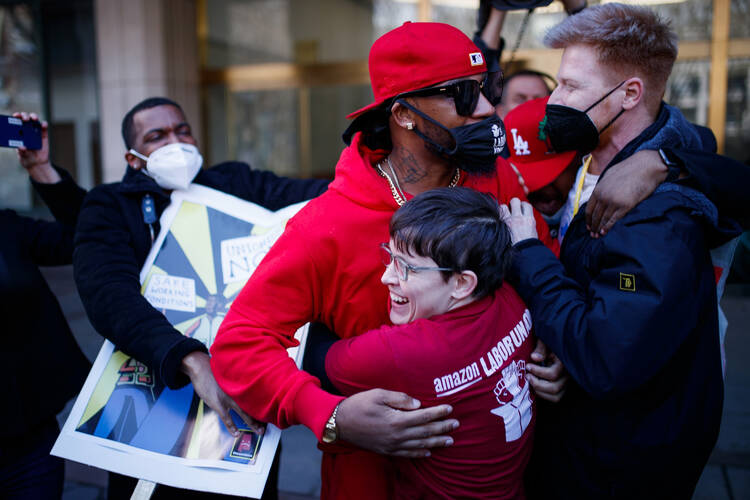Amazon warehouse workers on Staten Island, N.Y., made history in March by voting to unionize, the first time this has ever happened at the corporate behemoth. In doing so, the year-old independent Amazon Labor Union succeeded where established unions had failed—most notably in Bessemer, Ala., where Amazon workers overwhelmingly rejected representation by the 60,000-member Retail, Wholesale and Department Store Union in 2021. (The National Labor Relations Board forced a rerun of that election after the board ruled that Amazon illegally interfered with employee rights, but as of writing, the union is still narrowly trailing.)
What was different on Staten Island? The principle of subsidiarity, found in Catholic social teaching, can provide some answers.
Subsidiarity teaches that we are social creatures who crave connections to our fellow men and women. We build those connections with those closest to us and then outward, starting with our immediate families and spreading into our neighborhoods, churches, schools and workplaces. Subsidiarity holds that grassroots bodies can better provide for the common good than higher-level authorities that are disconnected from local communities. While most closely connected with Catholic social teaching, many thinkers, leaders and organizers throughout history have grasped its insights.
So did Amazon Labor Union’s organizers. First off, they were not outsiders. They enjoyed a natural connection with Amazon employees because they all worked there. The only organizer not currently employed by Amazon is Chris Smalls, the A.L.U.’s most visible spokesperson, and that is because management fired him in 2020 for protesting unsafe working conditions.
What was different on Staten Island? The principle of subsidiarity, found in Catholic social teaching, can provide some answers.
“We are the actual workers of the company, who know the ins and outs of the company,” Mr. Smalls told a local political news outlet, City & State New York, after the union’s win.
Contrast this with established labor’s reliance on outside professional organizers for many of its campaigns. While some unions only hire organizers from the ranks, others heavily rely on staff with little to no connection with the workplaces or industries they are trying to organize.
Second, the A.L.U. understood that organizing is not a sprint but a marathon. For more than two years, organizers spoke to their co-workers daily. Victory depended not just on gathering signatures, but on developing real-world relationships. And like any relationship, that takes time.
The labor union’s organizers enjoyed a natural connection with Amazon employees because they all worked there.
In an interview with Jacobin magazine, Mr. Smalls criticized the Alabama organizers for focusing on rallies featuring out-of-state politicians instead of local workers. “Bringing in politicians like Nina Turner and [U.S. Representatives] Jamaal Bowman and Cori Bush is good, but a lot of workers at Amazon don’t know them, especially in Alabama.... I think that at a worker-led rally, you connect people’s stories.”
Third, the A.L.U. worked to ensure that it was not just another impersonal, remote institution (like Amazon itself), but a loving and supportive family. For example, one of its most successful organizing tools was the communal meal. “If you want to bring people together, you feed them,” Mr. Smalls said in an online conversation with Senator Bernie Sanders. “Food is the way to the heart. We had Thanksgiving several times throughout the year, not just on Thanksgiving.”
Echoing the sacrament of the Eucharist, communal meals helped transform a warehouse of isolating workers into a genuine community. Additionally, sharing different cuisines helped unite workers of diverse cultures.
Finally, the A.L.U. practiced the virtue of charity by providing direct assistance to workers in need—from covering someone’s Uber ride to the hospital to launching a GoFundMe campaign to cover a fired employee’s rent. Even with its limited resources, the union built loyalty by stepping into a role akin to that of a family or a parish.
Even with its limited resources, the union built loyalty by stepping into a role akin to that of a family or a parish.
There are numerous good economic reasons why America needs a stronger labor movement (along with an overhaul of the nation’s labor law system). Research shows that unions are one of the most potent instruments for slashing income inequality. They are especially effective in reducing racial and gender pay gaps. And union jobs are safer jobs, which is especially relevant at Amazon, where warehouse jobs have been found to be twice as dangerous as those at comparable companies.
But an often-ignored benefit of unions is the role they play in strengthening local communities and promoting genuine solidarity among members, which is just as critical to promoting the common good as a good contract. As Pope Pius XI wrote in the encyclical “Quadragesimo Anno” in 1931, “A true, genuine social order demands that the various members of a society be united together by some bond” (No. 84).
With the breakdown of flesh-and-blood institutions, including organized religion and traditional families, Americans are looking for community. They are hungering for what Pope Francis has termed the “culture of encounter,” which can’t be sated by social media. This isn’t just good for people’s spiritual or personal well-being. A vibrant civil society that serves as a mediator between local communities and the power of both big business and big government is crucial to the proper functioning of democracy as well.
Of course, building an organic community from the bottom up is much harder than just gathering signatures or winning an election. It cannot be done just by raising money or buying ad time.
Nonetheless, Chris Smalls and his co-workers have proved that it can be done. Start small. Act locally. Start with those you share a real connection with. And build out from there. That takes time and patience. But it may be labor’s best bet for a comeback.








